
Source: Motto frederick douglass 2,
Wikimedia
While he was still a slave, Frederick Douglass, the self-educated orator of the antislavery movement in nineteenth-century America, worked as a caulker in the shipyards. A caulker made a vessel watertight by packing its seams with oakum, strands of old rope soaked in tar. Shortly after he became a free man, Douglass worked in a brass foundry manually pumping a heavy beam up and down to inflate and deflate a bellows that produced a strong blast of air. When he left that job, Douglass noted that he had been replaced by a machine. “The bellows which I worked by main strength was, after I left, moved by a steam-engine.”
Similar to Douglass’s job at the bellows, words can also be replaced or cease to be useful. For example, a mizzen is a sail attached to a ship’s mast, but knowing this word isn’t necessary to function in our century. Today we mostly see sails of this kind on ships found in movies, books, and museums. In other words, mizzen has ceased to be a useful word for most people (except sailors) and has become archaic. In the nineteenth-century, however, this word would have been known by many people because ships were the only way to cross the ocean or transport large amounts of goods.

Source: The bellows in the Nail Forge,
Hoylandswaine - geograph.org.uk, Humphrey
Bolton, Wikimedia

Source: Kalfatern, Zur See, von Henk Verlagsanstalt
und Druckerei, Hamburg, 1885, Wikimedia
Even when a word becomes archaic, there are plenty of new ones to take its place. As you continue reading, you will see that dictionary makers add new words every time they produce a new edition.
So how can you learn the thousands of vocabulary words you need to survive in school and later on in life? First, you can read to increase your exposure to new vocabulary. Second, you can apply strategies to your reading that will make you more efficient at learning words. In this lesson, you will use both of these tools as you read passages from “My Escape from Slavery” by Frederick Douglass.